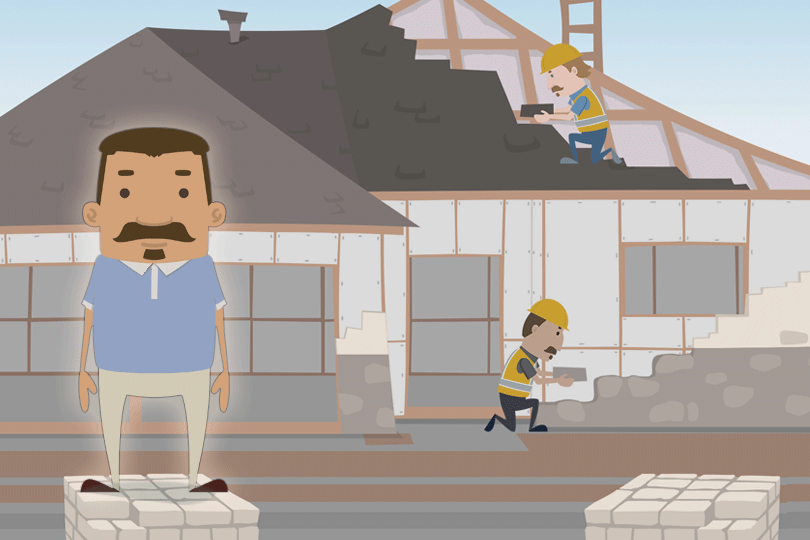How to Find the Best Construction Loan Mortgage Rates

The first bit of advice is the most obvious. Work hard on your FICO scores a year ahead of your loan, and try to get your credit scores into the most acceptable-to-the-lender range so you can qualify for a lower rate.
But that’s not the only thing you can do. Forbes.com advises potential borrowers that shopping aggressively for a One-Time Close lender can help, as well as the following strategies:
- Save for a larger down payment
- Ask lenders about rate-lock and float-down options
- Refinance your construction loan to a lower rate
The key to considering this as an option in 2024 is time. Rates haven’t fallen as low in the earliest days of the new year as they might in the second or even third quarter of the fiscal year. It pays to keep an eye on these conditions as you plan your One-Time Close loan.
What about other financial pundits and blogs? What do borrowers need to understand about construction loans to get the most out of them?
Advice from Investopedia in this area includes the notion that construction loan interest rates may vary “based on whether you have a construction loan to finance just the construction period or whether you have a combined single close loan that blends the construction and the permanent mortgage.”
This is an elaborate way of saying a single-close construction loan may be the more attractive option for lenders and borrowers alike.
Why? “The construction-only loan is considered a bit riskier. The rates for these are in the 5% to 10% range, and typically at least 5% higher than traditional permanent mortgage rates to buy an existing home.”
Some will also consider the loan term they are applying for. It may sound like a great idea to get a 15-year loan for a home, but if you need to keep your payments lower and prioritize having more available cash each month, a 30-year loan makes more sense.
Talk to several participating lenders about your options for an FHA One-Time Close construction loan, a VA single-close mortgage, or related choices. Ask the lender to compare your costs and options with a two-close construction loan for a better perspective on what you’re committing to when you want to build a home from the ground up.
 FHA, VA, and USDA: One-Time Close Loans
FHA, VA, and USDA: One-Time Close Loans
Want More Information About One-Time Close Loans?
We have done extensive research on the FHA (Federal Housing Administration) and the VA (Department of Veterans Affairs) One-Time Close Construction loan programs. We have spoken directly to licensed lenders that originate these residential loan types in most states and each company has supplied us the guidelines for their products. We can connect you with mortgage loan officers who work for lenders that know the product well and have consistently provided quality service. If you are interested in being contacted by a licensed lender in your area, please send responses to the questions below. All information is treated confidentially.
FHA.com provides information and connects consumers to qualified One-Time Close lenders to raise awareness about this loan product and to help consumers receive higher quality service. We are not paid for endorsing or recommending the lenders or loan originators and do not otherwise benefit from doing so. Consumers should shop for mortgage services and compare their options before agreeing to proceed.
Please note that investor guidelines for the FHA and VA One-Time Close Construction Program only allows for single family dwellings (1 unit) – and NOT for multi-family units (no duplexes, triplexes or fourplexes). In addition, the following homes/building styles are not allowed under these programs, including but not limited to: Kit Homes, Barndominiums, Log Cabin Homes, Shipping Container Homes, Stilt Homes, Solar (only) or Wind Powered (only) Homes, Dome Homes, Bermed Earth Sheltered Homes, Tiny Homes, Accessory Dwelling Units, or A-Framed Homes.
Contact Us: Send Us Your Request – Spam Safe
Please send your email request to [email protected] which authorizes FHA.com to share your personal information with one mortgage lender licensed in your area to contact you.
1. Send your first and last name, e-mail address, and contact telephone number.
2. Tell us the city and state of the proposed property.
3. Tell us your and/or the Co-borrower’s credit profile: Excellent – (680+), Good - (640-679), Fair – (620-639) or Poor- (Below 620). 620 is the minimum qualifying credit score for this product.
4. Are you or your spouse (Co-borrower) eligible veterans? If either of you are eligible veterans, down payments as low as $0 may be available up to the maximum amount your debt-to-income ratio per VA will allow – there are no maximum loan amounts as per VA guidelines. Most lenders will go up to $1,500,000 and review higher loan amounts on a case-by-case basis. If not, the FHA down payment is 3.5% up to the maximum FHA lending limit for your county.

Do you know what's on your credit report?
Learn what your score means.







